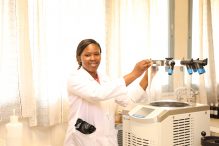Innovative research produces patented breakthrough product improving the economic status of women in Burkina Faso
Safiatou TRAORE, a national of Burkina Faso, is enrolled for her PhD studies at the Center for Training, Research and Expertise in Medicine Sciences (CFOREM) hosted by Joseph KI-ZERBO University. She is currently in her 1st year of doctoral study in ‘Development of Phytomedicines’ and expects to graduate in 2023. She specifically chose to study with CEFOREM because of the high-quality teaching methods and the personal inspiration and guidance from Professor Rasmané SEMDE, who gave her the zeal and courage to not give up after successfully completing her Master’s. She appreciates the fact that she could balance her family life with her research work and studies.
Ms TRAORE PhD research is a continuation of her research at Masters level. Her research title is “research and development of creams based on honey, shea butter and Burkinabè plant extracts for the treatment of burns”. She indicated that in Burkina Faso, 13.7% of children under the age of 5 are admitted in hospitals for burns (2015). The local treatment of burns is currently based on expensive imported products which are financially inaccessible to the majority of the population.
Safiatou aims to develop a stable honey-shea-butter cream for the local treatment of burns to help support those most vulnerable who cannot afford to purchased imported burn treatment creams. The two raw materials are proven to have healing properties and most importantly, are locally produced, readily available, and at a low cost. “This research will not only produce an affordable local treatment for burns, but will also create new outlets and commercial opportunities for the honey and shea butter producers, who are mainly women’s associations in Burkina Faso.”
The patent of this innovative and problem-solving research product has been registered with the African Intellectual Property Organization, an intellectual property organization headquartered in Yaoundé, Cameroon. The shea-butter-honey cream is already on high demand by Burkinabè clinicians and pediatric surgeons. The Joseph KI-ZERBO University incubation office has invested in this product, including it within their framework as a university start up business. A business plan has been developed for its commercial exploitation and expansion.
The African Regional Intellectual Property Organization (ARIPO) defines a patent as “a set of exclusive rights granted by law to applicants for inventions that are new, non-obvious and commercially applicable”. Patents are important because they allow holders to commercially exploit their inventions on an exclusive basis. The global patent system is intended to inspire innovation by giving creators time-limited exclusive legal rights, thus assisting them to appropriate the returns from their innovation.
In the short term Ms TRAORE wishes to participate in the valorization of local Burkinabe natural resources. Medium to long term, she hopes to become a seasoned academic, continuing to share and pass on knowledge and experience to build the next generation of female scientists. Safiatou’s academic journey has made her a strong believer in developing research capabilities of Africa. “There is no need to aim to only enroll in PhD programs in western universities.” Many women find it challenging to leave their families for studies – thus eventually not pursuing PhDs. Ms TRAORE advises that opportunities do exist in Burkina Faso for quality doctoral training and research programs. As a special plea to women, she states “sometimes family conditions hold back the ambitions of women to pursue their doctorate studies. Through centers in Africa like CEFOREM, which create conducive conditions for their female candidates – it is now possible for female scientists to enroll for their PhDs.”
Safiatou tells us that “studying at CEFOREM has proved to be rewarding because of the availability of the supervision team, the accessibility of reagents and consumables, the excellent support provided to each student and the presence of foreign students that allows exchange of experiences.” The ACE for development impact centers are demonstrating that through student-led research it is possible to foster creativity and innovation for economic growth and development in Africa.
